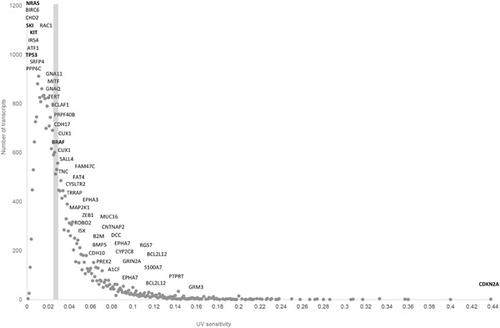当前位置:
X-MOL 学术
›
Hum. Mutat.
›
论文详情
Our official English website, www.x-mol.net, welcomes your
feedback! (Note: you will need to create a separate account there.)
Human genes differ by their UV sensitivity estimated through analysis of UV-induced silent mutations in melanoma.
Human Mutation ( IF 3.3 ) Pub Date : 2020-07-09 , DOI: 10.1002/humu.24078 Ivan P Gorlov 1 , Christopher I Amos 1 , Spiridon Tsavachidis 1 , Colin Begg 2 , Eva Hernando 3 , Chao Cheng 2 , Ronglai Shen 2 , Irene Orlow 2 , Li Luo 4 , Marc S Ernstoff 5 , Joel Parker 6 , Nancy E Thomas 7 , Olga Y Gorlova 1 , Marianne Berwick 8
Human Mutation ( IF 3.3 ) Pub Date : 2020-07-09 , DOI: 10.1002/humu.24078 Ivan P Gorlov 1 , Christopher I Amos 1 , Spiridon Tsavachidis 1 , Colin Begg 2 , Eva Hernando 3 , Chao Cheng 2 , Ronglai Shen 2 , Irene Orlow 2 , Li Luo 4 , Marc S Ernstoff 5 , Joel Parker 6 , Nancy E Thomas 7 , Olga Y Gorlova 1 , Marianne Berwick 8
Affiliation

|
We hypothesized that human genes differ by their sensitivity to ultraviolet (UV) exposure. We used somatic mutations detected by genome‐wide screens in melanoma and reported in the Catalog Of Somatic Mutations In Cancer. As a measure of UV sensitivity, we used the number of silent mutations generated by C>T transitions in pyrimidine dimers of a given transcript divided by the number of potential sites for this type of mutations in the transcript. We found that human genes varied by UV sensitivity by two orders of magnitude. We noted that the melanoma‐associated tumor suppressor gene CDKN2A was among the top five most UV‐sensitive genes in the human genome. Melanoma driver genes have a higher UV‐sensitivity compared with other genes in the human genome. The difference was more prominent for tumor suppressors compared with oncogene. The results of this study suggest that differential sensitivity of human transcripts to UV light may explain melanoma specificity of some driver genes. Practical significance of the study relates to the fact that differences in UV sensitivity among human genes need to be taken into consideration whereas predicting melanoma‐associated genes by the number of somatic mutations detected in a given gene.
中文翻译:

人类基因的紫外线敏感性有所不同,这是通过分析紫外线诱导的黑色素瘤沉默突变来估计的。
我们假设人类基因对紫外线 (UV) 暴露的敏感性不同。我们使用了通过全基因组筛查检测到的黑色素瘤体细胞突变,并在癌症体细胞突变目录中进行了报告。作为 UV 敏感性的衡量标准,我们使用给定转录本的嘧啶二聚体中 C>T 转换产生的沉默突变数量除以转录本中此类突变的潜在位点数量。我们发现人类基因因紫外线敏感性而变化两个数量级。我们注意到,黑色素瘤相关肿瘤抑制基因CDKN2A是人类基因组中对紫外线最敏感的前五个基因之一。与人类基因组中的其他基因相比,黑色素瘤驱动基因具有更高的紫外线敏感性。与癌基因相比,抑癌基因的差异更为显着。这项研究的结果表明,人类转录本对紫外线的敏感性差异可能解释了一些驱动基因的黑色素瘤特异性。该研究的实际意义在于,在通过给定基因中检测到的体细胞突变数量来预测黑色素瘤相关基因时,需要考虑人类基因之间紫外线敏感性的差异。
更新日期:2020-07-09
中文翻译:

人类基因的紫外线敏感性有所不同,这是通过分析紫外线诱导的黑色素瘤沉默突变来估计的。
我们假设人类基因对紫外线 (UV) 暴露的敏感性不同。我们使用了通过全基因组筛查检测到的黑色素瘤体细胞突变,并在癌症体细胞突变目录中进行了报告。作为 UV 敏感性的衡量标准,我们使用给定转录本的嘧啶二聚体中 C>T 转换产生的沉默突变数量除以转录本中此类突变的潜在位点数量。我们发现人类基因因紫外线敏感性而变化两个数量级。我们注意到,黑色素瘤相关肿瘤抑制基因CDKN2A是人类基因组中对紫外线最敏感的前五个基因之一。与人类基因组中的其他基因相比,黑色素瘤驱动基因具有更高的紫外线敏感性。与癌基因相比,抑癌基因的差异更为显着。这项研究的结果表明,人类转录本对紫外线的敏感性差异可能解释了一些驱动基因的黑色素瘤特异性。该研究的实际意义在于,在通过给定基因中检测到的体细胞突变数量来预测黑色素瘤相关基因时,需要考虑人类基因之间紫外线敏感性的差异。









































 京公网安备 11010802027423号
京公网安备 11010802027423号